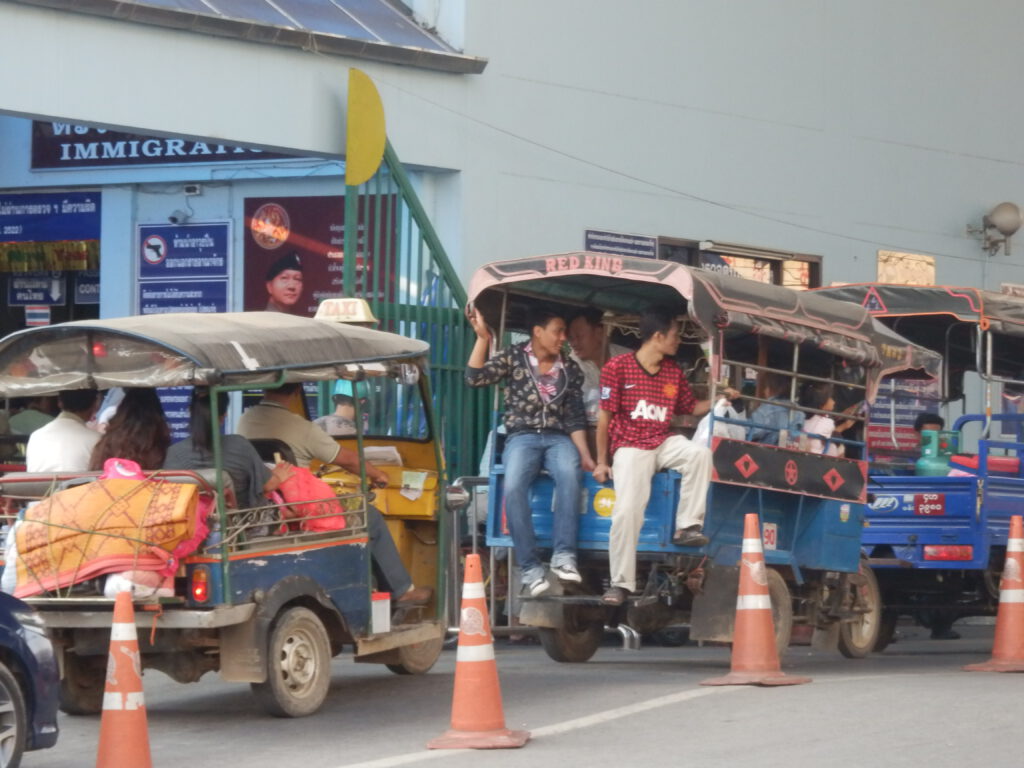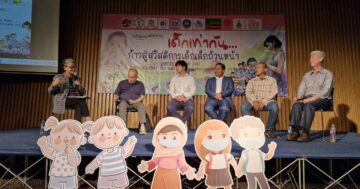
มูลนิธิเพื่อสิทธิมนุษยชนและการพัฒนา (มูลนิธิฯ) ในฐานะองค์กรภาคประชาสังคม ออกแถลงการณ์แสดงความกังวลต่อการแก้ไขปัญหาการค้ามนุษย์ โดยเฉพาะการบังคับใช้แรงงานในประเทศไทย ย้ำปีที่ผ่านมาประเทศไทยได้รับการประเมินให้อยู่ในระดับที่ 2 (Tier 2) เช่นเดียวกับปีนี้ ขอเสนอ 7 ข้อแก้ไขปัญหา
เมื่อวันที่ 20 มิถุนายน 2562 กระทรวงการต่างประเทศ สหรัฐอเมริกา ได้นำเสนอรายงานสถานการณ์การค้ามนุษย์(Trafficking in Persons Report : TIP report) โดยมีวัตถุประสงค์เพื่อประเมินมาตรฐานการคุ้มครองผู้เสียหายจากการค้ามนุษย์ของแต่ละประเทศว่าเป็นไปตามมาตรฐานขั้นต่ำของประเทศสหรัฐอเมริกาหรือไม่ รายงานฉบับนี้ส่งผลต่อการประเมินของประเทศสหรัฐอเมริกาในการสนับสนุนประเทศไทยในด้านต่างๆ โดยในปีที่ผ่านมาประเทศไทยได้รับการประเมินให้อยู่ในระดับที่ 2 (Tier 2) กล่าวคือ ประเทศไทยยังมีมาตรการในการแก้ไขปัญหาการค้ามนุษย์ต่ำกว่ามาตรฐานของสหรัฐอเมริกาแต่เห็นได้ชัดว่า มีความพยายามที่จะแก้ไขปัญหา
ในปีนี้ประเทศไทยได้รับการประเมินให้อยู่ในระดับที่ 2 ดังในปีที่ผ่านมาโดยรายงานระบุว่า ประเทศไทยยังคงต้องพัฒนาและแก้ไขปัญหาต่างๆ อันนำไปสู่การค้ามนุษย์ โดยประเด็นที่น่าสนใจในรายงานมีดังนี้
- เจ้าหน้าที่ผู้มีส่วนเกี่ยวข้องในการป้องกันและปราบปรามการค้ามนุษย์ยังคงประสบปัญหาไม่สามารถคัดแยกผู้เสียหายจากกรค้ามนุษย์ได้อย่างมีประสิทธิภาพ โดยพบว่าบางกรณีเจ้าหน้าที่เลือกที่จะไม่ประเมินให้มีบุคคลใดเข้าข่ายเป็นผู้เสียหายเนื่องจากกลัวว่าจะเกิดผลกระทบกับตนเอง
- ในปีที่ผ่านมา ประเทศไทยได้ให้ความช่วยเหลือผู้เสียหายจำนวน 631 คน โดยมีผู้เสียหายจำนวน 149 คนที่ไม่แน่ใจว่าเป็นผู้เสียหายจากการค้ามนุษย์ประเภทใด
- สถานคุ้มครองสวัสดิภาพผู้เสียหายจากการค้ามนุษย์ของรัฐยังคงมีปัญหาในการดูแลผู้เสียหายในด้านการเยียวยาจิตใจ ขาดล่ามแปลภาษาเพื่อใช้สื่อสารกับผู้เสียหาย
- แม้ว่าประเทศไทยจะมีพัฒนาการทางกฎหมายเพื่ออำนวยความสะดวกให้ผู้เสียหายสามารถเรียกร้องค่าสินไหมทดแทนจากผู้กระทำความผิดได้สะดวกยิ่งขึ้น แต่กลับไม่มีรายงานระบุจำนวนค่าสินไหมทดแทนที่แท้จริงที่ผู้เสียหายได้รับจากผู้กระทำความผิด
- แม้กฎหมายว่าด้วยการป้องกันและปราบปรามการค้ามนุษย์จะวางหลักให้มีการคุ้มครองผู้ที่ร้องเรียนการค้ามนุษย์(whistleblower) ต่อเจ้าหน้าที่รัฐก็ตาม แต่ในปีที่ผ่านมาเจ้าหน้าที่กลับยินยอมให้นายจ้างหรือผู้ประกอบการแจ้งความข้อหาหมิ่นประมาทแก่แรงงานและผู้ที่แจ้งความแก่เจ้าหน้าที่รัฐ
- นอกจากกฎหมายว่าด้วยการป้องกันและปราบปรามการค้ามนุษย์แล้วประเทศไทยยังมีพัฒนาการในกฎหมายคุ้มครองแรงงานและนโยบายการจ้างแรงงานข้ามชาติ ทั้งนี้ในทางปฏิบัติกลับพบว่าแรงงานข้ามชาติยังคงถูกละเมิด อาทิเช่น แรงงานยังคงถูกเรียกเงินจากนายหน้าจัดหางานในราคาที่สูงกว่ามาตรฐาน แรงงานภาคเกษตรยังคงได้ค่าจ้างที่ต่ำกว่าอัตราค่าจ้างที่กฎหมายกำหนด ขาดแนวปฏิบัติที่ชัดเจนในการตรวจสอบเงื่อนไขการทำงานของแรงงานประมง รวมถึงประเทศไทยยังคงจำกัดสิทธิในการรวมกลุ่มของแรงงานข้ามชาติ ซึ่งปัญหาในทางปฏิบัติเหล่านี้เป็นต้นเหตุในการนำไปสู่ปัญหาการค้ามนุษย์ในแรงงานรูปแบบต่างๆ
มูลนิธิเพื่อสิทธิมนุษยชนและการพัฒนา (มูลนิธิฯ) ในฐานะองค์กรภาคประชาสังคมที่ให้ความช่วยเหลือแรงงานข้ามชาติและผู้เสียหายจากการค้ามนุษย์จากการบังคับใช้แรงงาน เห็นว่า แม้รัฐไทยได้มีความพยายามแก้ไขปัญหาการค้ามนุษย์มาตลอด โดยเฉพาะอย่างยิ่งในช่วง 5 ปีที่ผ่านมาหลังจากที่ประเทศไทยถูกประเมินว่าเป็นประเทศที่ไม่ปฏิบัติตามมาตรฐานขั้นต่ำ (Tier 3) แต่ปัญหาการค้ามนุษย์ยังคงไม่ได้รับการแก้ไขอย่างเหมาะสม โดยเฉพาะอย่างยิ่งการบังคับใช้กฎหมายอย่างมีประสิทธิภาพและสอดคล้องกับเจตนารมณ์ของกฎหมาย การชดใช้เยียวยาผู้เสียหาย
ประเด็นที่ได้ถูกกล่าวขึ้นในรายงานสถานการณ์การค้ามนุษย์ฉบับนี้ ซึ่งเป็นประเด็นที่ มูลนิธิฯ ได้พยายามนำเสนอต่อรัฐบาลไทยและหน่วยงานที่เกี่ยวข้องมาตลอดเพื่อส่งเสริมให้แรงงานสามารถเข้าถึงสิทธิอันพึงมีของตนเองและเพื่อขจัดปัจจัยที่นำไปสู่ปัญหาการค้ามนุษย์ด้านการบังคับใช้แรงงานอย่างยั่งยืน ซึ่งมูลนิธิฯ กังวลว่าปัญหาการค้ามนุษย์ยังคงเกิดขึ้นต่อไป หากรัฐไทยไม่สามารถแก้ไขปัญหาเหล่านี้ได้ ยิ่งไปกว่านั้น มูลนิธิฯ มีความวิตกกังวลมากยิ่งขึ้น จากการแถลงข่าวของรัฐมนตรีว่าการกระทรวงเกษตรและสหกรณ์ เมื่อวันที่ 19 มิถุนายนที่ผ่านมา ว่ารัฐบาลกำลังดำเนินการอย่างเร่งด่วนเพื่อแก้ไข พระราชกำหนดประมง พ.ศ. 2560 ถึง 16 มาตรา โดยขาดการปรึกษาหากับผู้มีส่วนเกี่ยวข้องทุกภาคส่วน ซึ่งอาจจะกระทบต่อมาตรการในการป้องกันและแก้ไขปัญหาการค้ามนุษย์ในภาคประมงทะเล
ดังนั้น เพื่อให้การแก้ไขปัญหาเป็นไปอย่างยั่งยืน มูลนิธิเพื่อสิทธิมนุษยชนและการพัฒนา จึงมีข้อเสนอต่อรัฐบาลดังต่อไปนี้
- รัฐไทยควรจัดให้มีหน่วยงานกลางในการตรวจสอบกระบวนการคัดแยกผู้เสียหายจากการค้ามนุษย์ที่ดำเนินการโดยเจ้าหน้าที่ท้องถิ่น เพื่อให้มั่นใจว่ากระบวนการคัดแยกผู้เสียหายจากการค้ามนุษย์เป็นไปอย่างเหมาะสมและมีประสิทธิภาพ อีกทั้งควรมีมาตรการส่งเสริมในการให้สิทธิแก่บุคคลที่ได้รับการประเมินว่าเป็นผู้เสียหายและผู้ที่ได้รับการประเมินว่าไม่ใช่ผู้เสียหายจากการค้ามนุษย์ แต่เป็นผู้เสียหายตามกฎหมายอื่น ให้สามารถเข้าถึงสิทธิของตนเอง
- รัฐไทยต้องเร่งสร้างกลไกและแนวปฏิบัติในการบังคับคดีค้ามนุษย์ รวมถึงสร้างหลักประกันให้แก่ผู้เสียหายว่ารัฐไทยจะให้ความช่วยเหลือเยียวยาแก่ผู้เสียหายอย่างเพียงพอและทันท่วงทีจนกว่าจะได้รับค่าสินไหมทดแทนตามคำพิพากษา
- รัฐไทยควรจัดสรรงบประมาณในการแก้ไขปัญหาการค้ามนุษย์อย่างเหมาะสมและครอบคลุมในทุกกระบวนการ เพื่อลดปัญหาการขาดแคลนบุคลากรในการให้ความช่วยเหลือผู้เสียหายจากการค้ามนุษย์ เช่น ล่ามแปลภาษา เป็นต้น
- รัฐไทยต้องสร้างหลักประกันว่าเจ้าหน้าที่จะบังคับใช้กฎหมายอย่างถูกต้อง มีแนวปฏิบัติที่ชัดเจน โดยมุ่งเน้นคุ้มครองแรงงานและผู้ที่ให้ความช่วยเหลือแรงงาน
- รัฐไทยควรทบทวนความริเริ่มที่จะแก้ไข พระราชกำหนดประมง พ.ศ. 2560โดยควรจะต้องรับฟังความเห็นจากผู้เกี่ยวข้อง โดยเฉพาะแรงงาน ผู้เสียหายจากการค้ามนุษย์และองค์การภาคประชาสังคมที่เกี่ยวข้อง เพราะการแก้ไขในหลายประเด็น เช่นการผ่อนปรนการใช้เครื่องติดตามเรือ เป็นต้น อาจกระทบต่อมาตรการในการป้องกันและช่วยเหลือผู้เสียหายจากการค้ามนุษย์ในกิจการประมงได้
- รัฐไทยต้องมีมาตรการที่จริงจังเร่งด่วน เพื่อป้องกันมิให้มีการฟ้องร้องดำเนินคดีทั้งทางแพ่งและอาญาต่อแรงงงานหรือผู้ให้ข้อมูลโดยสุจริต(Strategic Litigation Against Public Participation : SLAPP) ทั้งนี้เพื่อให้สอดคล้องกับเจตจำนงทางกฎหมายและนโยบายของรัฐในเรื่องการป้องกันและปราบปรามการค้ามนุษย์และแผนปฏิบัติการระดับชาติว่าด้วยธุรกิจกับสิทธิมนุษยชน
- รัฐไทยต้องมีนโยบายอย่างเป็นรูปธรรมในการจัดให้มีการมีส่วนร่วมระหว่างหน่วยงานภาครัฐกับภาคประชาสังคมที่ทำงานด้านการต่อต้านการค้ามนุษย์และการบังคับใช้แรงงานในการป้องกัน แก้ไขปัญหาการค้ามนุษย์ และปกป้องและคุ้มครองสิทธิมนุษยชนของผู้เสียหายอย่างจริงจัง
————————————————————————————————————————–
แถลงการณ์ภาษาอังกฤษ
Press Release: Concerns over Efforts to Address Trafficking in Persons and Forced Labor in Thailand
On 20 June 2019, the United States Department of State launched a report on the state of trafficking in persons (Trafficking in Persons Report: TIP report) with an aim to evaluate the standards for the protection of survivors from trafficking in persons in different countries in comparison to the US minimum standards. This report is used as a benchmark by the US and would inform its policy to offer support to Thailand in various aspects. Last year, Thailand was put at Tier 2, meaning that the country’s measures to address trafficking in persons are still not up to the minimum standards set by the US although it was obvious that efforts have been made to address the issue.
This year, Thailand remains in Tier 2 just like the previous year. The report indicates that Thailand still needs to do more to solve various problems which have given rise to trafficking in persons. Important issues raised include:
- The authorities involved with the prevention and suppression of trafficking in persons still fail to ensure effective screening of survivors from trafficking in persons. In certain instances, the officials were reluctant to identify victims as the officials due to fears of impacts on them.
- Last year, Thailand has rescued 631 survivors with 149 of them have yet to be classified as any specific group of survivors from trafficking in persons.
- The state welfare facilities for survivors from trafficking in persons are unable to offer the survivors effective mental rehabilitation and interpretation services.
- Even though Thailand has developed legal measures to facilitate the survivors’ legal fight to demand compensation from the perpetrators, but in the report, there was no mention about the actual amount of compensation the survivors have received from the perpetrators.
- Even though the Anti-Trafficking in Persons Act singles out a principle to protect whistleblowers who report cases of trafficking in persons to the authorities. But in the past year, the Thai authorities have allowed the employers or business operators to file defamation charges against the workers and whistleblowers who he brought labour complaints to the authorities.
- Apart from the Anti-Trafficking in Persons Act, Thailand has developed laws to offer labor protection and prescribe policies on the employment of migrant workers. Still, in reality, some migrant workers continue to face violations, i.e., being charged with a fee by the brokers at a rate much higher than the standard, agricultural sector workers are being paid lower than the minimum wage, a lack of clear guideline for labor inspection in fishery work, and Thailand’s legal restriction which prohibits the right to freedom of association among the migrant workers. Such problems at the practical level have given rise to trafficking in persons in various forms of labor.
As a civil society organization which has been supporting migrant workers and survivors from trafficking in persons from forced labor, the Human Rights and Development Foundation (HRDF) has found that even though efforts have continually been made by the Thai government to address trafficking in persons, particularly in the past five years since Thailand was put at the lowest tier (Tier 3), the issues of trafficking in persons have still not been solved effectively, particularly in terms of the strict enforcement of the laws, compliance with the spirit of the laws and compensation for the survivors.
The issues raised in the TIP Report had previously been raised by HRDF to the Thai government and concerned authorities in order to promote access to due rights among the workers and to sustainably address factors have given rise to trafficking in persons, particularly on forced labor. HRDF is concerned that the issue of trafficking in persons will continue unabated unless the Thai government can solve all these problems. HRDF have even been alarmed by the announcement made during the Minister of Agriculture and Cooperatives’ press conference on 19 June that an urgent effort is being made to revise the 16 Sections of the Royal Ordinance on Fisheries (No.2) B.E.2017 without seeking prior consultation from all stakeholders; Such move might impede the measures for the prevention and suppression of trafficking in persons in sea fishing sector in a long run.
Therefore, to ensure sustainable solutions, HRDF would like to propose to the Thai government the following recommendations:
- The Thai government should set up a central agency to carry out the inspection of the survivor screening process which is being conducted by local authorities. It would help to ensure proper and effective survivor screening process. Moreover, an effort should be made to enhance access to various rights among those who have been verified as survivors from trafficking in persons and non-survivors who could after all be considered an injured party according to other laws.
- The Thai government should accelerate the effort to develop mechanisms and guidelines for legal execution in trafficking in persons cases and assure the survivors that the Thai government would guarantee that they receive sufficient and prompt support while awaiting the compensation after the case is decided.
- The Thai government should set aside funding to address trafficking in persons appropriately and comprehensively in all stages. An effort should be made to address a shortage of personnel to offer help to the survivors from trafficking in persons including interpretation services, among others.
- The Thai government should guarantee that the authorities shall enforce the laws properly and adhere to clear guidelines which aim to offer labor protection and address the needs of workers.
- The Thai government should review the initiative to revise the Royal Ordinance on Fisheries (No.2) B.E.2017 and should first seek consultation from stakeholders, particularly the workers and survivors from trafficking in persons and civil society organizations since some of the proposed revisions including the relaxation of the Vessel Monitoring System (VMS) installation since it will affect the measures for the prevention and rescue of survivors from trafficking in persons in fishing sector.
- The Thai government should put in place, seriously and promptly, a measure to prevent the launch of both civil and criminal suits (Strategic Litigation Against Public Participation: SLAPP) against the workers or whistleblowers who have acted in good faith. This can be done in compliance with the spirit of the laws and the state policies for the prevention and suppression of trafficking in persons and the National Action Plan on Business and Human Rights (NAP).
- The Thai government should institute concrete policies to provide for cooperation between the authorities and civil society sector working to combat trafficking in persons and forced labor in the effort to prevent and suppress trafficking in persons and to seriously protect and uphold human rights of the survivors.
———————————————————————————————————————————–
With respect in human rights and human dignity
Human Rights and Development Foundation (HRDF)
For more information, please contact:
Mr. Papob Siamhan, Case Director, Human Rights and Development Foundation (HRDF)’s Anti Human Trafficking in Labour Project, tel. 065-904-2329,
E-mail: p.siamhan@gmail.com
Ms. Chonthicha Tangworamongkon, Director of Human Rights and Development Foundation (HRDF), tel. 087-553-9689
Email: chonatwork@gmail.com



